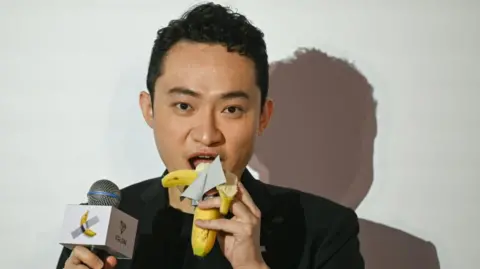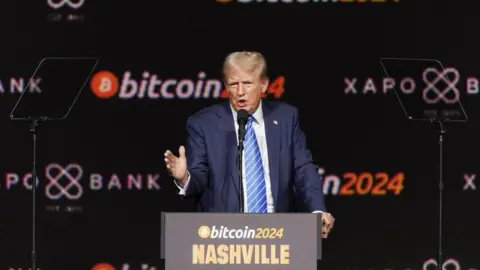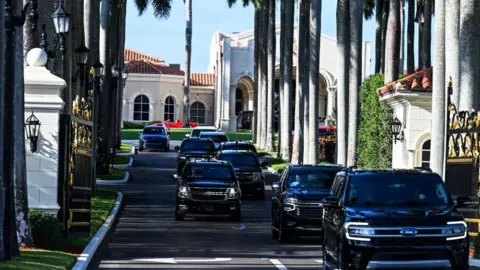 Getty Images
Getty ImagesNot long after buying and publicly consuming $6.2 million worth of bananas as part of an art-world stunt, Chinese cryptocurrency entrepreneur Justin Sun has sold $30 million ($30 million) to a cryptocurrency company called World Liberty Financial. 23.5 million) and made another eye-catching purchase.
The company has been in business since it was founded in October, and investors appear to have been concerned about the company's prospects and terms.
However, it boasted potentially attractive features. It's an opportunity to do business with a company that is partnered with and promoted by none other than Donald Trump.
Son's investment puts the company above the threshold that would allow the next president to profit from the business. Trump and his family currently stand to collect about $20 million, and potentially more.
Sun, who is currently fighting fraud charges in the United States related to his cryptocurrency business, declined to answer questions about how he became interested in non-tradable tokens.
But the episode has set off alarm bells among government ethics experts, who say Trump's expansion has meant that those seeking to influence U.S. policy are now more likely to steer money in his direction. I think this shows that it has become easier than ever.
Richard Painter, who served as the White House's chief ethics lawyer during the George W.
 Getty Images
Getty ImagesIn a statement to the BBC, Trump's team dismissed the concerns.
“President Trump stepped away from his multibillion-dollar real estate empire during his first term to run for office and put his government payroll upfront,” said Caroline Levitt, Trump's press secretary.
“Unlike many politicians, President Trump is not in politics for profit. He is fighting because he loves the people of this country and wants to make America great again.”
But President Trump has done little to address concerns about potential or emerging corruption as he prepares to return to the White House.
new chance
Trump has faced questions about conflicts of interest before.
During his first term as president, the Trump International Hotel in Washington, D.C., became a symbol of this issue, serving as a hangout for lobbyists, diplomats, and allies.
Critics argued that the hotel created a way for Trump to indirectly profit from the office of president. He faced charges and lawsuits for violating the U.S. Constitution, which prohibits the president from receiving foreign compensation or profiting from his office.
But experts say the growth of his business empire, which now includes a publicly traded social media company, a cryptocurrency company, and a partnership with a Saudi-backed golf league, means those seeking to expedite the movement of money more quietly. He says that it is now possible. A much larger amount.
“It's gotten bigger, it's gotten easier,” said Michael, a New York University law professor who runs Truth Social and has studied Trump Media, which now accounts for most of Trump's $6 billion fortune. Ohlrogge says. “There are a limited number of hotel rooms available for reservation.”
For example, on Truth Social, Prof. Ohlrogge said foreign governments and companies could buy advertising to convince investors that the company is gaining momentum, prompting the stock to soar.
Trump Media has a market value of more than $7 billion, but so far there has been little sign of such activity. The company reported advertising sales of less than $5 million this year.
But Professor Ohlrogge said that given the “amplification” effect of the stock market, a large outlay was not necessary to potentially generate large profits for President Trump, who owns more than half of the company's shares.
“His stance in support of virtual currency”
Nowhere is the entanglement between Mr. Trump's business interests and public life more acute than in the cryptocurrency industry. He has become more personally involved in the crypto industry, promising to champion it during his time in the White House.
His plan includes ideas such as deregulation and a national Bitcoin reserve, where the government would stockpile the cryptocurrency.
“One of the most important questions to be decided in the next few years is how cryptocurrencies will be regulated,” said Virginia Cantor, chief ethics adviser at the bipartisan Citizens for Responsibility and Ethics in Washington. ” he said. “Now, he is active in the crypto market. How that is regulated will (could) impact his personal assets and what position he stands in. It will also affect whether you take it.”
Nick Bhatia, founder of Bitcoin Layer, a company that advocates for investing in Bitcoin, said it would be a mistake to dismiss President Trump's stance on cryptocurrencies as driven solely by his own economic interests. Ta.
“I don't think these movements are motivated by self-interest. I see them as representing the voters,” he said.
But still, he said, “I think there is probably a conflict of interest in that his pro-crypto stance benefits his company.”
 Getty Images
Getty ImagesPresident Trump announced this week that he will nominate Paul Atkins, an industry veteran, to head the Securities and Exchange Commission (SEC).
He is widely expected to strengthen the agency's crackdown on publicly traded companies such as Trump Media for fraud, insider trading and other issues. The SEC was overseeing a crackdown on the cryptocurrency industry under President Joe Biden.
Mr. Sun, an investor with World Liberty Financial, was subject to an SEC crackdown last year after the agency accused him and his company of failing to properly register with the government when selling certain digital assets. got caught up in
John Coffee, a professor at Columbia University School of Law and an expert on securities law, said there's a good chance the agency will drop the case under the new guidance.
“Mr. Atkins' main characteristic is that he doesn't like enforcement and wants to significantly limit the scope of lawsuits brought by the SEC,” he said.
When Sun announced the investment last month, he did not mention the SEC complaint (which he said had no merit), but he did note Trump's views on cryptocurrencies.
“America is becoming a blockchain hub and Bitcoin is thanks to @realDonaldTrump!” he told X. “TRON is committed to making America great again and leading in innovation. Let's go! ” he wrote.
Reduced guardrails
U.S. law has few limits on conflicts of interest, and the president is not bound by the same rules that govern other government officials and cabinet members.
The U.S. Constitution theoretically prohibits presidents from accepting gifts from foreign governments while in office, but the Supreme Court has already dismissed two previous cases involving potential conflicts of interest during President Trump's first term. I am doing it.
Last summer, a court case involving Mr. Trump also ruled that the president has broad immunity from criminal prosecution while in office.
Mr. Trump has argued in the past that his business actually suffered during his time in the White House as partners severed ties over disputes and faced investigations and lawsuits.
Now preparing to enter the White House for the second time, President Trump has yet to unveil his customary ethics plans and has shown little sign that he intends to cave in to such concerns.
He has vowed to keep his stake in Trump Media, continue selling Trump-branded products and lending his name to ventures like World Liberty Financial. His club, Mar-a-Lago, remains a place where wealthy individuals willing to pay membership fees have access to the president, with little transparency.
Ethics experts worry that Mr. Trump has opened a door that will be difficult to close again.
“Trump got the message that now that he won, he can do whatever he wants,” Painter said. “Future presidents will look at this and think, 'We can do whatever we want.'”



